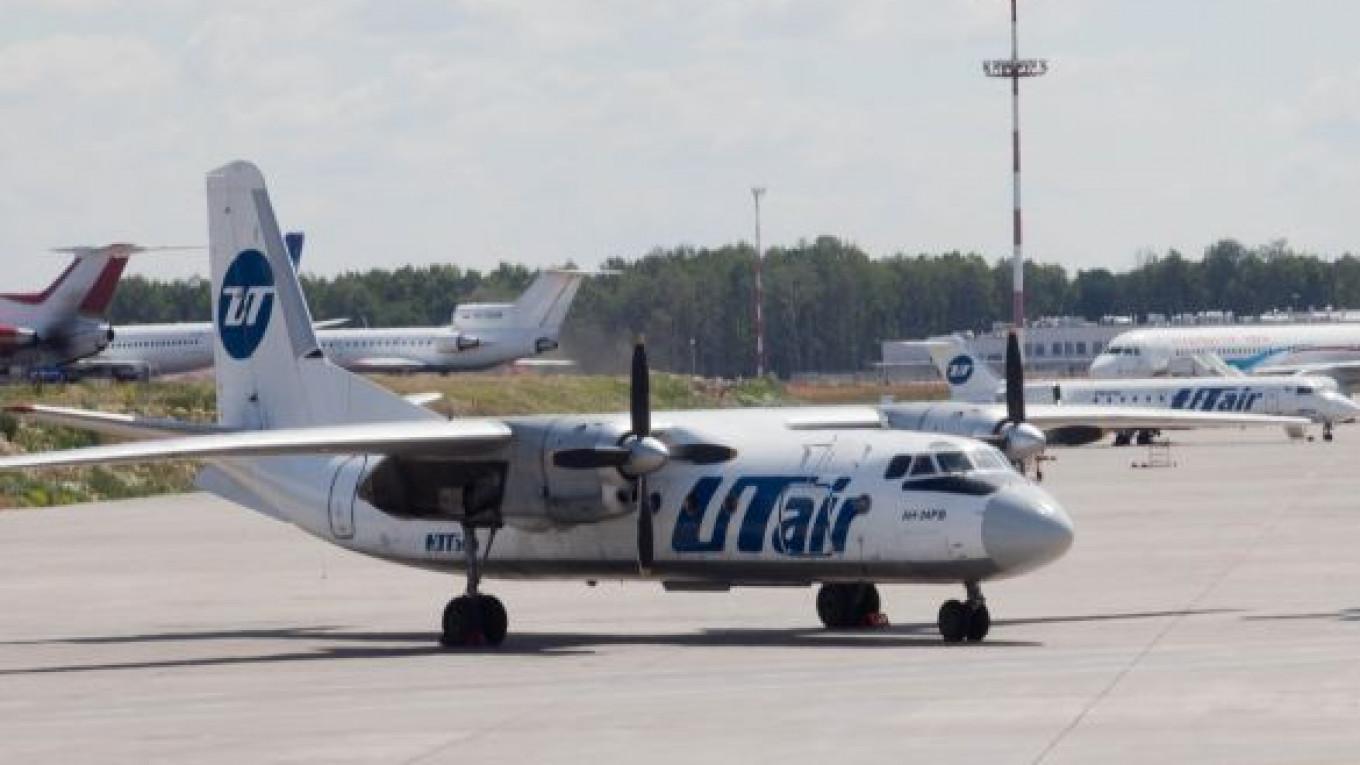A Far Eastern court on Wednesday sentenced a former IrAero airline pilot to 1 1/2 years of travel restrictions for violating air safety rules when crash-landing a Soviet-made An-24 plane last year.
Blagoveshchensk City Court on Wednesday found Vladimir Ryabinkov guilty of air safety violations resulting in severe injury to at least one person, the Prosecutor General’s Office said in a on its website.
The court barred him from leaving the Novosibirsk region town of Ulan-Ude, where he resides, for 18 months without notifying authorities, among other restrictions.
The plane Ryabinkov was flying, an An-24, more than 1,000 of which were produced in the 1960s and ’70s, remains a workhorse for some regional airlines despite a checkered safety history.
On Aug. 8, 2011, Ryabinkov made an emergency landing in stormy weather at the Blagoveshchensk airport in the Amur region, landing the plane off the runway. Twelve passengers were injured in the crash, and the plane was badly damaged.
Ryabinkov was in October with failing to obey the orders of the automated plane system to slow down when it told him that he was landing unsafely, Kommersant reported at the time.
Following the crash-landing of an An-24 operated by Angara Airlines in July 2011 that killed seven people, then-President Dmitry Medvedev said the turboprops should be grounded. But the Transportation Ministry said only regular An-24 flights would be halted, not charter flights, which make up the bulk of An-24 traffic.
An earlier government order required regional airlines to install expensive safety equipment on the aging aircraft, which fly only domestic routes, and at least some airlines have modified their An-24 planes to prevent crashes.
, the country’s third-biggest airline with a fleet of 225 planes, has 19 An-24 aircraft, all of which it has equipped with crash-prevention systems, airline spokeswoman Yelena Galanova said by phone.
The turboprops remain the cheapest aircraft and are indispensable for landing in distant northern regions where landing strips are unpaved, Galanova said.
Some regional airports, such as that in the far northern town of Tiksi, are even being renovated in part to allow landings of An-24 planes, meaning their use will likely continue in the foreseeable future.
Galanova said that with proper maintenance and component replacement, any plane can be safely used indefinitely.
Angara Airlines, whose An-24 crash-landed in the Ob River on July 11, 2011, still operates six An-24 planes, to its website.
There are about 100 An-24 planes still in commission in Russia, Galanova said.
Earlier this week in Yakutsk, an An-24 actually came to the rescue of a group of passengers instead of being involved in an accident.
A Czech-made L-410 turboprop operated by Polar Airlines, a small Sakha-based carrier, with 19 people on board made an emergency landing Tuesday minutes after taking off from an airfield near Yakutsk due to an engine problem, Rossiiskaya Gazeta reported. No one was hurt in the incident, and the plane was not damaged.
All the passengers were later airlifted by an An-24 to their destination — the small town of Ust-Maya, about 400 kilometers away.
Related articles:
A Message from The Moscow Times:
Dear readers,
We are facing unprecedented challenges. Russia's Prosecutor General's Office has designated The Moscow Times as an "undesirable" organization, criminalizing our work and putting our staff at risk of prosecution. This follows our earlier unjust labeling as a "foreign agent."
These actions are direct attempts to silence independent journalism in Russia. The authorities claim our work "discredits the decisions of the Russian leadership." We see things differently: we strive to provide accurate, unbiased reporting on Russia.
We, the journalists of The Moscow Times, refuse to be silenced. But to continue our work, we need your help.
Your support, no matter how small, makes a world of difference. If you can, please support us monthly starting from just $2. It's quick to set up, and every contribution makes a significant impact.
By supporting The Moscow Times, you're defending open, independent journalism in the face of repression. Thank you for standing with us.
Remind me later.






